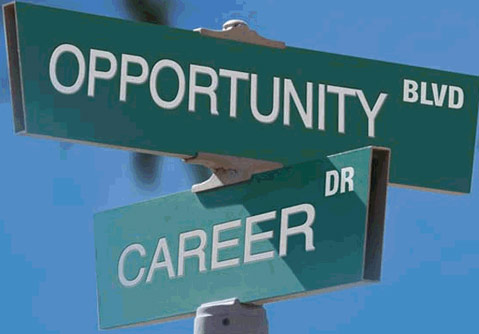Delay the Real World
Career Tips for College Grads

College graduates nationwide are on the hunt for a job. We have our degrees in hand, pristine resumes, and enough poise to knock the socks off of any employer.
But while we have looked forward to this milestone deemed entering “the real world,” the idea of taking on a new environment, holding a career position, and struggling to pay rent can be intimidating.
Never fear: Although many tasks, trials, and tribulations (not to mention the historic recession the country is currently undergoing) lie on the road to success, there are also a wealth of tips and resources to help you land that dream career.

Freshman year marks the turning point when undergrads must decide their major. At the time, I believed that decision would determine my future, salary, and potential achievements. Yet a career counselor sat across a table from me four years ago explaining how the major does not absolutely matter; it is what you do with the major that counts. I wanted an answer, a crystal ball that would show my future, thus relieving all my anxiety. Today, college graduates are right back in that seat, not deciding their college majors—now they must choose their majors in life. Or do they?
Deb Artz, UCSB Career Services Department coordinator, says that we do not have to, yet. In fact, Artz’s number one tip is to in fact “delay the real world.” Despite this unnerving advice, Artz added, “There have been a couple of hopeful signs, which is encouraging for future entry-level job seekers.”
Over the past years, I have learned that life unfolds with many jobs, individuals, experiences, and decisions. There is no such thing as a single career. Rather, jobs are stepping stones toward realizing your ultimate passions and goals in life. If we always have our sights set on the destination, we will miss the doors and windows swinging open to alternate pathways.
UCSB offers majors, degrees, and credentials from chemical engineering to zoology to linguistics to geophysics. So there must be a job waiting around the collegiate corner for everyone, right? Given the current economic state of the U.S., how do we prepare to succeed in the future yet delay the inevitable?
Artz encourages people to take a year off, inventory their strengths, and start with what they know. “People take for granted fields in which they can truly excel,” Artz advised. Also, many graduates may be unaware of the job titles out there. “Graduates must dig below the surface,” she said.
Among its numerous tricks and tips, UCSB Career Services recommends reading the book, Delaying the Real World, an easy read offering nitty-gritty guidance for graduates in their twenties. “The book contains practical suggestions on how to see the world from a new perspective and creative ways to live without going into future debt,” Artz summed up.
Faced with the necessity to survive alone and hopefully excel outside of college, I find little solace in simply delaying the process. However, there are many options, which probably too few students research, that can aid in relieving debt and preparing for grad school and other future endeavors.
An alternative Peace Corps, AmeriCorps is an illustrious option highly recommended before breaking into the career world. AmeriCorps began in 1993 when President Bill Clinton signed the National and Community Service Trust Act. This act (establishing the Corporation for National and Community Service) brought an extensive range of domestic community service programs under the umbrella of one organization. Today’s AmeriCorps is, according to its literature, “a chance to apply your skills and ideals towards helping others and meeting critical needs in the community.” Information is available on the AmeriCorps Web site on such things as financial awards, term lengths, and locations and types of work.
For the adventurers in our graduating class, there is the option of jetting abroad to teach English for a year—or more. Artz mentioned that for less than $200, many city colleges offer summer programs leading to international certification as a teacher of English. If you’re in a hurry, Oxford Seminars offers an opportunity to earn a TEFL (Teaching English as a Foreign Language) certificate in just three weekends, but it’ll set you back about a thousand bucks. Cambridge University offers the Certificate in English Language Teaching for Adults (CELTA), which takes a little longer to earn and costs more. Click here for an online discussion on the relative merits of these and other options.
And a final tip from Artz: Social network. “Our students are pretty savvy and skillful, they should be able to apply these qualities beyond UCSB,” she said. Linkedin.com, an ostensibly professional version of Facebook.com, can be used for finding jobs and making connections.
Alumni Network is incredibly powerful. As a Gaucho we should definitely be connecting with different Gauchos. While our academic background surely counts, in the real world many opportunities are given on the basis of who you know.
In the meantime, as we await the real world and our future careers, Artz recommended that we graduates “take a deep breath.” I myself sometimes wish that I were graduating with a degree from UCSB’s accounting or engineering departments—degrees that typically guarantee jobs in the “big four” computer companies and accounting firms—but I know that there’s something out there for everyone.
So whether we are delaying or advancing our embarkation into the “real world,” find consolation and confidence in the future. We have paid our dues, done the hard work; it’s finally time to step back and sink our teeth into a new chapter.



